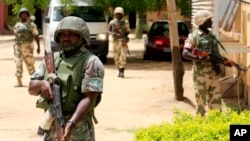ABUJA, NIGERIA —
Nigeria has asked a court to grant an extradition request for one of its citizens to the United States over charges of aiding the Yemeni branch of al-Qaida, court documents seen by Reuters on Tuesday showed.
U.S. and Nigerian authorities have accused Lawal Olaniyi Babafemi of traveling to Yemen with members of Al-Qaida in the Arabian Peninsula (AQAP) in 2010 and 2011 and receiving $8,600 in order to return to Nigeria and recruit English-speaking radicals.
“Olaniyi ... is being indicted for conspiracy to provide support to a foreign terrorist organization, provision and attempted provision of material support to a foreign terrorist organization, unlawful use of firearms,” the application from Nigeria's attorney general dated July 23, 2013 says.
Babafemi, 32, nicknamed “Ayatollah Mustapha”, was in the United States for some of the time that he and AQAP were plotting together.
He returned to Nigeria last year, whereupon the West African nation's secret service detained him. He faces at least 10 years in jail in the U.S. if convicted.
Nigeria, which is suffering its own Sunni Islamist insurgency by Boko Haram militants in the north, is closely watched by the United States and other Western powers, which fear al-Qaida-linked militants are seeking to use it as a springboard for attacks.
Its huge population of more than 160 million - half of them Muslims - combined with widespread poverty and its strategic importance as an oil supplier make Nigeria an obvious place of interest for global jihadist groups, analysts say.
On Christmas Day in 2009, Umar Farouk Abdulmutallab, a Nigerian from a wealthy northern family, made a botched attempt to blow up a plane flying from Amsterdam to Detroit.
He had made two trips to Yemen and admitted links to AQAP, which also claimed the attack.
The security situation in Yemen is fragile. The U.S. told its citizens in Yemen on Tuesday to leave the country and airlifted some of its government personnel out, following warnings of potential “terrorist attacks”.
U.S. and Nigerian authorities have accused Lawal Olaniyi Babafemi of traveling to Yemen with members of Al-Qaida in the Arabian Peninsula (AQAP) in 2010 and 2011 and receiving $8,600 in order to return to Nigeria and recruit English-speaking radicals.
“Olaniyi ... is being indicted for conspiracy to provide support to a foreign terrorist organization, provision and attempted provision of material support to a foreign terrorist organization, unlawful use of firearms,” the application from Nigeria's attorney general dated July 23, 2013 says.
Babafemi, 32, nicknamed “Ayatollah Mustapha”, was in the United States for some of the time that he and AQAP were plotting together.
He returned to Nigeria last year, whereupon the West African nation's secret service detained him. He faces at least 10 years in jail in the U.S. if convicted.
Nigeria, which is suffering its own Sunni Islamist insurgency by Boko Haram militants in the north, is closely watched by the United States and other Western powers, which fear al-Qaida-linked militants are seeking to use it as a springboard for attacks.
Its huge population of more than 160 million - half of them Muslims - combined with widespread poverty and its strategic importance as an oil supplier make Nigeria an obvious place of interest for global jihadist groups, analysts say.
On Christmas Day in 2009, Umar Farouk Abdulmutallab, a Nigerian from a wealthy northern family, made a botched attempt to blow up a plane flying from Amsterdam to Detroit.
He had made two trips to Yemen and admitted links to AQAP, which also claimed the attack.
The security situation in Yemen is fragile. The U.S. told its citizens in Yemen on Tuesday to leave the country and airlifted some of its government personnel out, following warnings of potential “terrorist attacks”.





